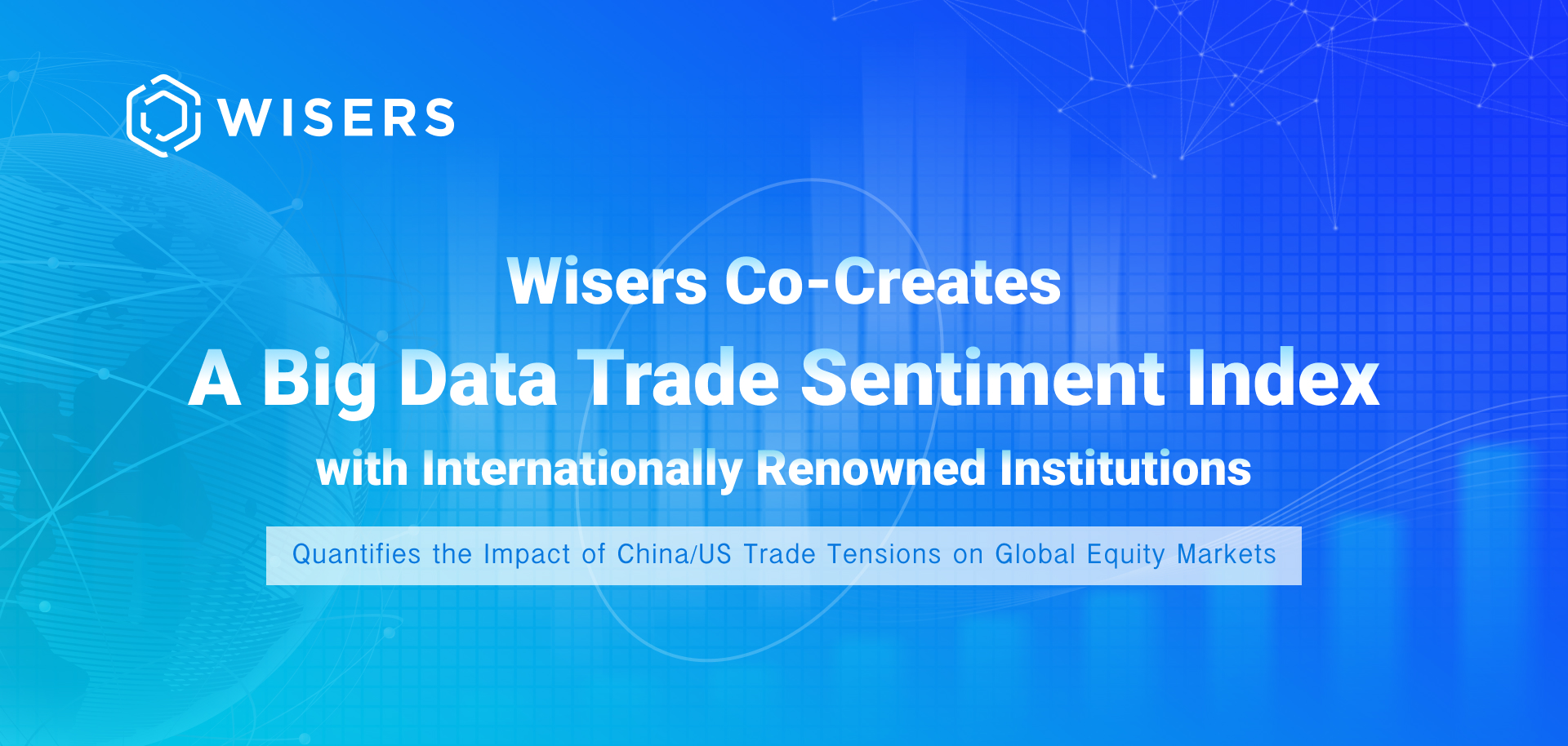-
Call
-
Live Chat
-
Free Trial

Please Follow Wisers' WeChat public account

Wisers Co-Creates A Big Data Trade Sentiment Index That Quantifies the Impact of China/US Trade Situations on Global Equity Markets
Release Time:2021-02-25 15:52:20

Wisers Co-Creates A Big Data Trade Sentiment Index That Quantifies the Impact of China/US Trade Situations on Global Equity Markets
Analysis reveals that 9% of model's capacity to explain stock price movements can be attributed to sentiment about China/US trade in Chinese social media
Hong Kong, February 25, 2021 – A big data trade sentiment index (TSI) created by data and AI experts and economists from Wisers Information Limited, the Bank of International Settlement, and Harvard University's Kennedy School reveals the impact of China/US trade situations on 60 global equity markets. Textual analysis and deep learning were applied to determine the sentiment of Chinese social media and online news articles regarding China/US trade over a 2.5 year period and evaluate its capacity to explain stock price variability at country, sectoral and firm levels.
The analysis revealed that sentiment about China/US trade had a broad and significant impact on global equity markets, specifically 10% of the model's capacity to explain stock market movements in countries that are more exposed to the China-US value chain. Sentiments from social media contributed 9% of the total impact, whereas sentiments from traditional media (i.e. magazines and newspapers) accounted for just 1%. The TSI analysis identified stock price influences that extended beyond the traditional drivers of equity markets such as changes in the value of the US dollar, oil prices, measures of risk aversion and monetary policy.
Looking at the effects across jurisdictions, no equity markets benefited from deteriorated trade sentiment and Asian markets tended to be particularly affected. As would be expected, the equity returns of US firms with larger revenue from China were more sensitive to trade sentiment changes, as were the sectors most affected by tariffs – such as telecommunications and IT.
"Clearly trade situations between China and US played an important role in swinging global stock markets but the effects are difficult to quantify. Our study breaks new ground in several ways," said Dr. Chao He, Vice President and Head of AI of Wisers Information Limited. "We used our proprietary deep learning sentiment analysis model to analyse the positive or negative tone of the media coverage instead of just counting keywords and articles, we looked at a large variety of data sources beyond news media coverage and single media channels, and we extended our analysis over years instead of days."
The pool of approximately 3.5 billion articles from 74,020 media sources provided by Wisers spanned January 2018 to June 2019. The enormous size and variety of sources in the data base enabled the deployment of big data solutions. The research team selected a broad spectrum of media outlets, of which more than 97% were social media (web media articles, Weibo and WeChat posts, and discussion boards and other microblogs) and 2.6% were traditional media. Only 9% of the total sources directly focus on finance and economics. 92% of the articles originated from publishers in Greater China including 72% from Mainland China and 9% from Hong Kong and 11% from Taiwan. Among other countries, 4% of data are from the USA, while the residual 4% comes from 81 other countries (Pakistan, India, UAE and UK sources account for half, around 2%).
A newer class of sentiment analysis technique was deployed that uses deep learning techniques to capture the semantic context for analysing the positive or negative tone of an article, instead of using predefined keywords.
The research was conducted by an international team including Marlene Amstad, Harvard University Kennedy School and Asian Bureau of Finance and Economic Research (ABFER); Leonardo Gambacorta, Bank for International Settlements (BIS) and Centre for Economic Policy Research (CEPR); Chao He, Wisers Information Limited; and Dora Xia (BIS), and published as a BIS and CEPR Working Paper, ABFER members paper and Harvard Kennedy School M-RCBG Associate Working Paper.
The full text of the working paper is available here.
About Wisers Information
Founded in Hong Kong in 1998, Wisers is the world's leading expert in all-media big data smart business intelligence solutions. Wisers has specialised expertise to help financial services companies make smart decisions. Clients from equities, insurance, investment banking, private and many other financial sectors turn to Wisers for data-driven solutions tailored to their needs. Wisers AI Labs applies specialized AI models and leading NLP technologies across a range of risk Identification and management solutions.
Based on the intrinsic risk control factors embedded in news and social media, Wisers monitors and discovers potential risks through relevancy, sentiments, topics, and upstream and downstream relationships, etc. and leverages knowledge graph and massive media data to dig out explicit and implicit relationships between companies, senior executives, shareholders and other business entities and people to helps financial clients to gain a panoramic view of their customers and automatically identify important and risky ones.

 Brand Digitalisation
Brand Digitalisation Product Digitalisation
Product Digitalisation Digital Marketing
Digital Marketing Enterprise Digitalisation
Enterprise Digitalisation Digital PR
Digital PR  PR Crisis Management
PR Crisis Management Brand Management
Brand Management KOL Evaluation
KOL Evaluation 

